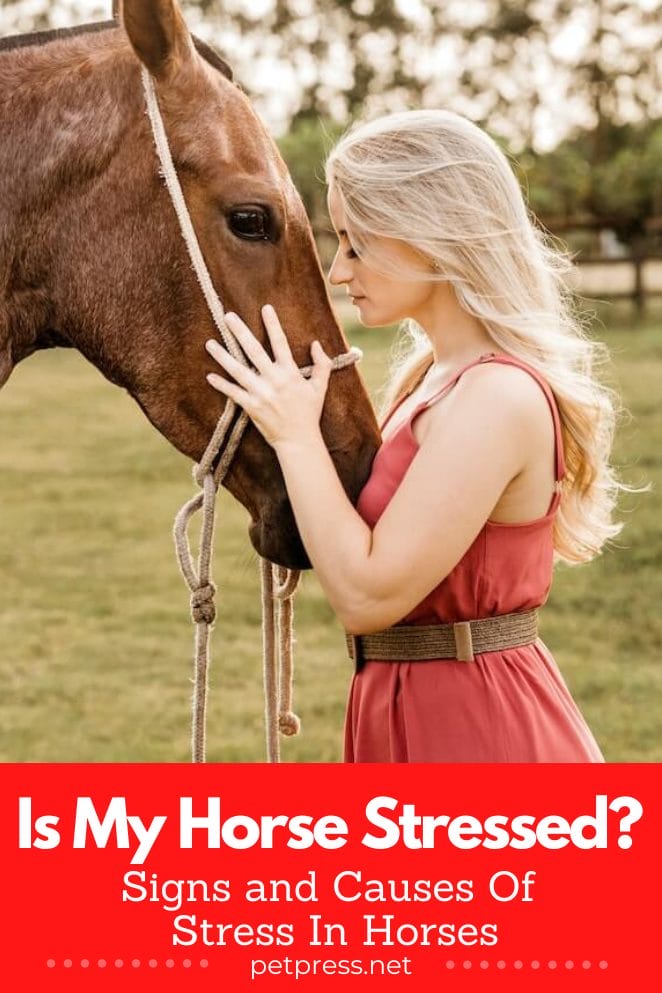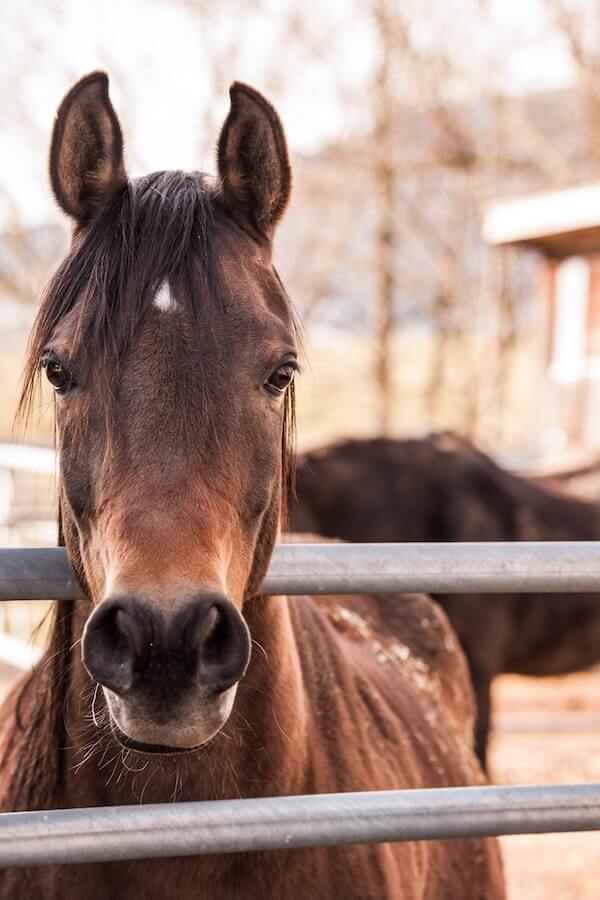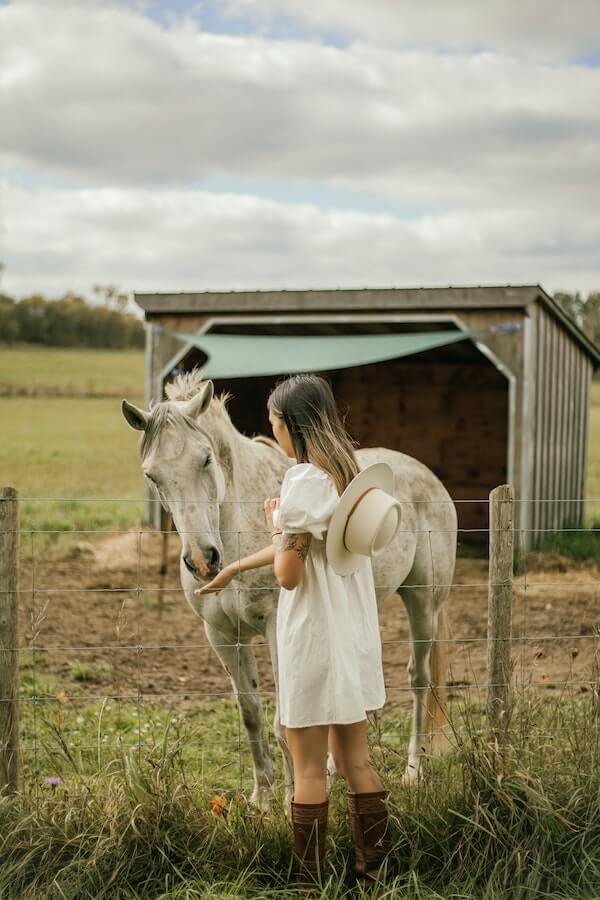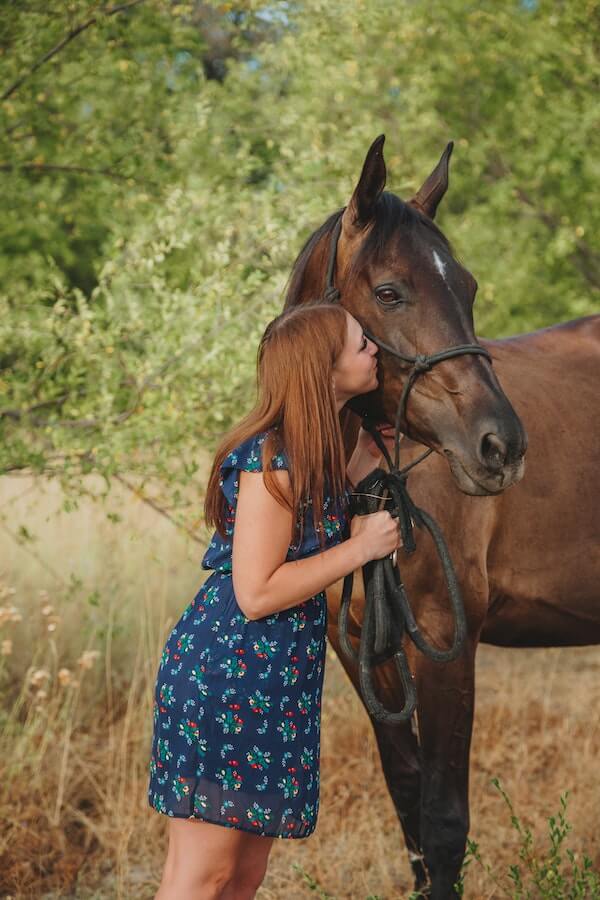
Do you find yourself asking yourself ” is my horse stressed?”, often? Is he exhibiting signs of anxiety, such as worrying about his food or pacing in his stall?
During their entire lifetime, horses can suffer from stress just like humans, so it’s essential for horse owners to be aware of the signs.
Let’s look at what causes stress in horses, how it affects them mentally and physically, and what we can do to help manage it.
What can cause stress in horses?

Let’s explore 10 common causes of stress in horses, so you can better understand your equine friend’s needs and keep them happy and healthy.
1. Diet Changes:
Horses are creatures of habit who thrive on consistency.
Even small changes to their diet such as switching from hay to pellets or grain can cause upset in the digestive system which leads to stress for the animal.
Introduce any new feeds slowly over several days, allowing the horse’s system to adjust and prevent stress.
2. Isolation/Lack of Socialization:
Horses are social animals that rely on being around other horses for both mental stimulation and emotional stability.
Isolating a horse from its herd can cause significant amounts of stress, as can under-socializing them with humans or other animals in their environment.
Spending quality time with your horse, allowing it to interact naturally with its herd mates, and regularly introducing new stimuli will help keep them relaxed and content.
3. Unfamiliar Surroundings:
Horses don’t do well outside their comfort zone, so even seemingly small changes such as changing the location of their feed tub or water trough can cause anxiety and stress.
When transporting a horse to a new environment, take the time to get them used to its new surroundings before asking for any performance.
4. Noisy Environments:
Loud noises can be terrifying for horses and lead to increased stress levels.
If a horse is routinely exposed to loud noises such as traffic or construction it can cause long-term anxiety that manifests in physical symptoms such as trembling or excess sweating.
Whenever possible, give your horse access to quiet areas of the property or barn to help keep them calm and relaxed.
5. Pain/Injury:
An injury or illness can cause significant amounts of pain and discomfort in horses, leading to increased levels of stress.
Regularly check your horse for signs of injury or lameness and take them to the vet immediately if anything seems out of the ordinary.
6. Poor Handling Practices:
Horses are prey animals who rely on humans for guidance and support – mishandling them will inevitably lead to stress.
You must have proper knowledge of basic horse care tips so that you get a good grip on horse handling.
Ensuring that all handlers are trained in proper horse-handling techniques and respecting the animal’s boundaries will help keep them feeling calm and secure.
7. Unfamiliar Riders/Inconsistent Handling:
Horses thrive on routine, so any changes or inconsistencies in their daily schedule can lead to anxiety and stress.
When introducing a new rider, take the time to get your horse comfortable with them before asking for performance or speed.
Likewise, when transferring between handlers, ensure that both parties use compatible handling practices for smooth transitions that won’t cause undue stress for the animal.
8. Lack of Exercise:
Is your horse getting enough exercise? A lack of appropriate physical activity can not only lead to boredom but also contribute to increased levels of stress.
Allowing your horse to move freely and regularly, with plenty of time for play, exploration, and grazing will help them stay relaxed and content.
What are the signs of stress in a horse?

Here’s a quick guide on 10 common signs of tension in horses. Keep an eye out for these and you’ll be able to tell if your horse needs a little extra love.
1) Sweating:
Horses that are stressed tend to sweat more than normal, especially around the neck and chest.
2) Changes in Eating Habits:
Is your horse suddenly eating less or more than usual? Horses may also start refusing certain foods they usually enjoyed when feeling anxious.
3) Increased Aggression:
Is your normally calm horse displaying sudden outbursts of aggression or irritability? This could be a sign of stress.
4) Unusual Posture:
Is your horse standing differently than normal? Keeping its head lower than usual is an indication that something might be wrong.
5) Increased Heart Rate:
When stressed, horses’ heart rate can spike significantly faster than their resting rate, so pay close attention to any changes in this area.
6) Loss of Appetite:
Is your horse not finishing its meals or leaving food in the bowl untouched? This could be a sign that something is bothering it.
7) Repetitive Behaviors:
Is your horse repeating certain behaviors, such as head bobbing or tail swishing? This can indicate a stressed state of mind.
8) Shying/Startling Easily:
Is your horse easily startled by loud noises or movements? If so, this could mean that it’s feeling overly anxious.
9) Dull Coat:
Is your horse’s coat looking dull and lifeless despite regular brushing and grooming? Stress can take away its natural sheen, so pay attention to any changes you see in this area.
The horse skin is also prone to sunburn so you need to keep that in mind too when maintaining their coat.
10) Changes in Behavior:
Is your horse suddenly behaving differently? Is it becoming more timid or withdrawn, for example? This could be a sign of stress.
What to do when your horse is stressed?

Learning how to recognize when your horse is stressed, as well as knowing what to do in those situations can mean the difference between a calm ride and total chaos!
Here are 10 tips for dealing with a stressed-out equine partner:
1. Pay close attention to their body language
Horses communicate through subtle body movements like ear placement, lip smacking, nostril-flaring, tail swishing, and more.
Being able to pick up on these cues will help you understand if your horse is feeling uncomfortable or uneasy about something.
2. Isolate the trigger
If you can identify the thing that’s causing your horse to become uneasy, it’ll be much easier to address and help them through it.
3. Give them space
If a situation is becoming too stressful for your horse, try backing away and giving them a moment to catch their breath.
Make sure there is no pressure from you or an environment that may be making them feel uncomfortable.
4. Avoid overreacting
When working with horses, it’s important to move slowly and deliberately so they don’t perceive any sudden movements as threatening in nature. This will help keep them calm during tense moments.
5. Reward good behavior
Reinforce positive behavior with treats or verbal praise. This will help your horse associate good things with the situation and build a stronger bond between you.
6. Find ways to de-stress
Incorporate activities that your horse enjoys into your daily routine, such as grooming or hacking out on the trails. It’ll give them an opportunity to relax and have fun in a safe environment.
7. Exercise patience
Horses don’t always respond immediately when we ask them to do something, so be patient and take the time to let them figure it out for themselves without micromanaging them too much.
8. Seek professional advice
If you think your horse is suffering from more serious behavioral issues, it’s best to seek the advice of a vet or qualified trainer.
Final Thoughts

Horses may not be able to tell us directly when they are stressed, but there are some signs that you can look out for.
Before buying a horse, you must also do a background check on them to understand if the horse has any temperament issues so that you can assist them during stress.
Take the time to observe and assess your horse’s condition – and if in doubt, consult with a veterinarian to find out if stress is playing a role.
After all, we don’t want our equine friends to be worrying rather than whinnying!
- 7 Dog Breeds With Webbed Feet And Why Do They Have Them - July 19, 2023
- 10 Best Fish For Small Tanks That Make Perfect Pets - July 18, 2023
- How to Breed Guinea Pigs: A Detailed Guide - July 17, 2023


GIPHY App Key not set. Please check settings